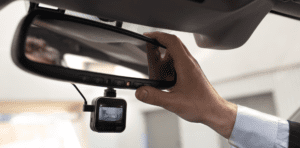Compare cheap car insurance
✔ Compare cheap car insurance quotes
✔ Over 110 insurance providers
✔ Get a quote in minutes
✔ Save up to £504*
It can be really annoying to see a parking ticket on your car’s windscreen. We have a guide that explains when you can dispute a ticket and how parking fines work. So, before you get upset, you should check if you have a valid reason to contest the ticket.
What are the Types of Parking Tickets?
There are a few common types of parking tickets or traffic penalties:
Fixed Penalty Notice (FPN) – Issued by the police
Fixed Penalty Notices (FPNs) are issued by the police for a range of minor offences, including parking violations and dangerous driving.


If you receive an FPN, points may be added to your driving licence, and you may be required to pay a financial penalty. In England and Wales, you typically have 28 days to pay the penalty or contest it in court.
When it comes to parking tickets, the most common ones are the Penalty Charge Notice (PCN) or the Excess Charge Notice (ECN), both issued by local authorities traffic wardens. You should be able to identify which one you have received, as it should be clearly stated on the ticket.
While both types of tickets are financial penalties, there is a significant difference between them. An Excess Charge Notice is considered a criminal charge, while a PCN is not.
Parking Charge Notice/PCN – Invoices issued by private companies for parking on private land
When you park on private land, such as in a supermarket or hospital car park, you may receive a Parking Charge Notice (PCN) from a private company if you overstay or do not follow the rules. PCNs are invoices that have been issued for a breach of contract and are not backed by law.
If you do not pay the amount owed, the parking company may write to you and may apply for a County Court judgment, but they will need to take you to civil court if they want you to pay the fine.
It is essential to understand the difference between PCNs and Penalty Charge Notices (issued for parking on public land) as PCNs are not backed by law and do not have the same legal standing.
How much can you save on your car insurance?
Is the ticket justified?
When you receive a parking ticket, it is important to determine if it is justified. Consider if you violated any advertised parking conditions, parked on private land, or exceeded the time limit.
If you were in the wrong, evaluate if the amount being charged is reasonable. Keep in mind that private companies cannot issue fines, but rather send notices for breach of contract.
However, if you believe the ticket is unfair and was issued by an official body, it is crucial to act quickly and gather evidence to support your case. This can include photographs, witness statements, or any relevant parking permits or signage.
How much can you save on your car insurance?
When Can You Challenge a Parking Ticket?
There are several circumstances where you can challenge a parking ticket. For example, if there were unclear signs or markings, or a fault in the technology used to issue the ticket, you may be able to challenge it.
However, there are situations where you will not be able to challenge the ticket, such as if you parked on a single red or double yellow line, or in an area reserved for permit holders.


If you blocked an entrance, bus stop, parking bay, or path of traffic, it will be challenging to appeal the ticket, and your chances of success are likely to be very low.
However, if you have mitigating circumstances such as being ill or the ticket falling off, you may be able to challenge the ticket. It is essential to proceed carefully and ensure you have enough evidence to support your claim.
Keep in mind that challenging a parking ticket can be a lengthy and frustrating process, and there is no guarantee that your challenge will be upheld.
How much can you save on your car insurance?
Know Your Rights if You’re Clamped or Towed
The prospect of having your car clamped or towed away is not a pleasant one and can cause concern about the cost of retrieving your vehicle or whether you can remove the clamp on your own.


Your Car Can be Clamped if:
- Illegal parking: If your car is parked on roads or public land, causing an obstruction, it can be clamped. This includes situations when your car has broken down and is obstructing the road.
- Invalid insurance: It is important to ensure your car insurance is valid and that you have set up your policy correctly to avoid getting clamped.
- Danger to other road users: The DVSA can clamp overloaded or unroadworthy vehicles that are deemed a danger to other road users.
- Commercial vehicle: If you’re driving a commercial vehicle, you can be clamped if you’ve been driving for too many hours or haven’t paid previous fines. It’s important to ensure compliance with driving and parking regulations to avoid getting clamped.
Getting your car unclamped can be a hassle, and you may have to pay a fine, depending on the reason for the clamp. To avoid the inconvenience and cost of being clamped, make sure to park your car legally and keep your insurance and vehicle in good condition.
Your Car Can be Towed if:
If you’ve parked illegally on public land, you run the risk of having your car towed away by the police or local councils. This can also happen if your car has broken down and is causing an obstruction.
Your car can also be towed away if it is untaxed. The Driver and Vehicle Licensing Agency (DVLA) has the power to tow any untaxed vehicle.


It’s important to make sure your vehicle is taxed or declared off the road with a SORN (Statutory Off Road Notification) to avoid this happening.
In addition, if your car insurance is invalid, it could be towed away. Be sure to check that your policy is valid and up-to-date and that you have set up your renewal or new policy correctly.
It’s worth noting that in England, Scotland or Wales, it’s illegal for your car to be clamped, towed, blocked in or immobilised on private land by a private operator. So, if your car has been removed from private land without your consent, you should seek legal advice.
How much can you save on your car insurance?
How to Challenge a Parking Ticket
Understanding the Issuer of the Ticket
The first step in challenging a parking ticket is to identify who issued it. Parking tickets can come from various authorities like local councils, the police, and private companies. Each issuer has a different appeals process, so it’s crucial to know whom you’re dealing with.
Gathering Evidence
If a local council or the police issued the ticket and you think it’s unjust, act swiftly to collect evidence. Photograph the surrounding area of your vehicle, focusing on any unclear signs. Also, if there were witnesses, get their contact details for potential future use.
The Appeals Process
The challenge process usually has three stages: an informal appeal, a formal appeal, and an appeal to the Independent Tribunal. These stages can vary in length, depending on the issuer and their workload. Be prepared for a potentially lengthy and arduous process.
Weighing Your Options
While you can pay the fine within 14 days for a reduced cost, appealing involves navigating the aforementioned steps.
However, be aware that the success rate for parking ticket appeals can be as low as 50%. Considering these odds, it’s important to evaluate whether the effort to challenge the ticket is worthwhile for you.
How much can you save on your car insurance?
Do You Have to Pay for a Private Parking Fine?
Understanding the Type of Fine
The requirement to pay a parking fine depends on who issued it. If it’s a Penalty Charge Notice (PCN) from the police or local council, payment is mandatory. These fines are legally enforceable, and not paying can lead to a court summons.
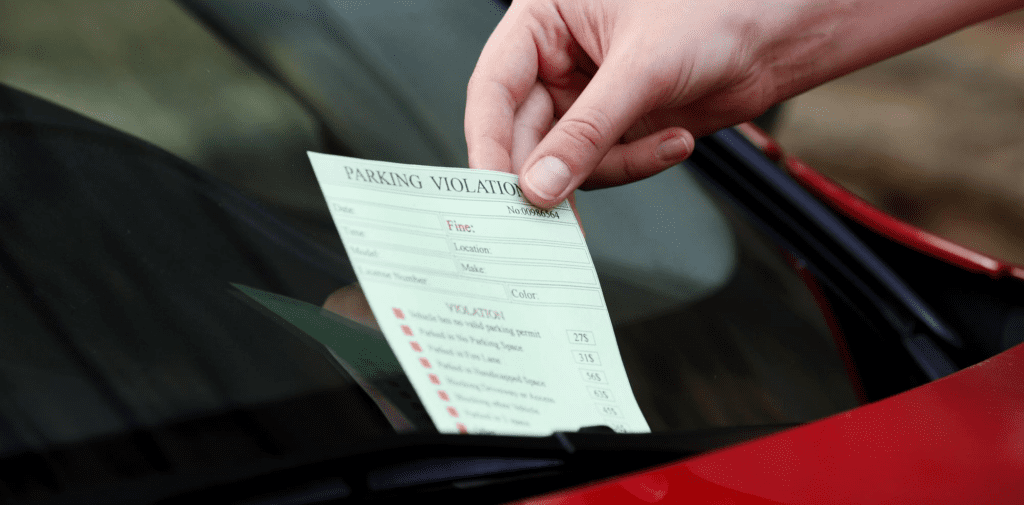

Dealing with Private Parking Fines
On the other hand, fines from private entities like car park operators or universities are different. Known as Parking Charge Notices, they are not actual fines but claims of a contractual breach.
Private companies cannot legally compel you to pay these ‘fines’ unless a court rules against you. Therefore, they don’t hold the same legal weight as PCNs issued by official bodies.
Options for Challenging a Private Fine
If you receive a private parking fine, you have the option to challenge it. This could mean appealing to the issuing company or using an independent appeals service like POPLA (Parking on Private Land Appeals) or IAS (Independent Appeals Service).
However, be mindful that success rates in these appeals can be low and the process may be quite demanding and stressful.
How much can you save on your car insurance?
What if the Company is Not a BPA or IPC Member?
Importance of Trade Body Membership
When dealing with a private parking ticket, it’s crucial to check if the issuer belongs to a trade body like the British Parking Association (BPA) or the International Parking Community (IPC). Membership in these organisations means that the company adheres to specific standards and practices.




Challenging a Ticket from a Non-Member Company
If the company that issued your ticket is not a member of these trade bodies, it can be a strong basis to appeal the ticket.
Non-member companies might not follow the established codes of practice that members are expected to adhere to. This lack of oversight can be a point in your favour when challenging the ticket.
Alternative Appeal Options
In cases where the issuer is not a member of a trade body, you might need to explore different ways to challenge the ticket.
This could involve appealing directly to the company or using independent appeal services like POPLA (Parking on Private Land Appeals) or IAS (Independent Appeals Service). Remember, though, that these avenues can be complex and time-consuming.
How much can you save on your car insurance?
What are my Options After my Parking Ticket Appeal is Reject?
Proceeding to an Independent Tribunal
If your formal appeal against a parking ticket is unsuccessful, you’ll typically receive a ‘Notice of Rejection of Representations’ along with a ‘Notice of Appeal’ form. This form allows you to escalate your case to an independent tribunal.
Appealing to a Government-Appointed Adjudicator
One path is to appeal to an adjudicator appointed by the government. This option can be advantageous as the adjudicator is unaffiliated with the issuing authority, potentially offering a more impartial judgement. To pursue this, submit the Notice of Appeal form within 30 days of its issuance.


Considering Legal Action
Alternatively, you might seek legal advice and consider taking your case to court. This route is more complex and time-consuming but might be necessary if you firmly believe the ticket was unjustly or unlawfully issued.
Weighing the Odds and Consequences
It’s important to note that success rates in such appeals are often low, and the process can be stressful.
However, if your case is strong, pursuing further action might be worthwhile. Do remember that ignoring a parking ticket can lead to additional fines, legal repercussions, and potential damage to your credit score.
How much can you save on your car insurance?
Do Parking Tickets Affect My Car Insurance?
Receiving a parking ticket is unlikely to affect your car insurance premium. Parking tickets are not seen as an indicator of your driving skills or safety on the road. Insurers typically focus on factors that directly relate to driving, such as speeding tickets, accidents, and traffic violations, when assessing risk.


Reporting Parking Tickets to Your Insurer
In most cases, you do not need to inform your car insurance company about a parking ticket. These tickets are not used by insurers to gauge your risk of being involved in an accident or making a claim.
Consequences of Ignoring Parking Tickets
While parking tickets don’t impact insurance premiums, it’s crucial to address them promptly. Ignoring or not paying a parking ticket can lead to further fines, legal actions, and potentially harm your credit score. To avoid these outcomes, it’s advisable to deal with any parking tickets as soon as possible.
How much can you save on your car insurance?
Tips for avoiding parking tickets
Double yellow lines indicate no parking at any time, even if you’re only stopping for a moment. The only exception is if you’re stopping to load or unload your vehicle.


A clearway is marked with a red cross over a blue background, and it means no stopping at any time, not even to pick up or drop off passengers.
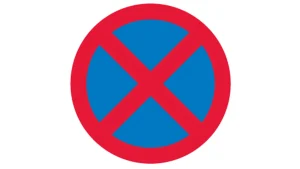

Ensure that you display your parking ticket clearly and legibly so that a parking warden can read it. Always check that it is visible after you have closed your car door.


Even if you don’t see other cars displaying tickets, be aware of parking signs and ensure that you are not breaking any local restrictions.
If you use a Blue Badge, make sure you check the parking restrictions and whether you need to pay or display a ticket.
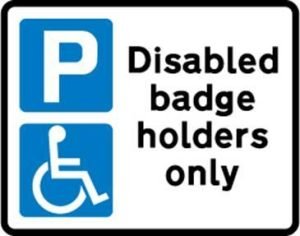

Always park in designated parking areas, such as car parks, to avoid getting ticketed.
Check any time restrictions on parking, as they can vary depending on the location and time of day.
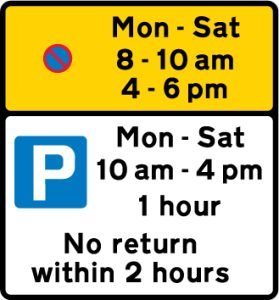

Ensure that you do not block driveways or entrances, even if you’re only stopping for a minute.
If you’re parked in a metered space, ensure that you keep the parking up-to-date to avoid getting ticketed.
If you’re unsure about the parking restrictions in a particular area, consider looking for alternative parking options, such as a nearby car park or street parking in a different area.
Compare cheap car insurance
Comparoo is a comparison website that allows you to compare cheap car insurance from over 110 providers. By using Comparoo, you can find the cheapest car insurance policy that suits your needs. With just a few clicks, you can compare policies from different providers and find the best deal.
Comparoo allows you to compare policies based on different factors such as cover, deductibles, and discounts. This means that you can find a policy that fits your budget and your cover needs.
On average, Comparoo customers can save up to £504 by comparing car insurance quotes. This is a significant saving that can help you to lower your car insurance costs and keep more money in your pocket.
If you’re looking for cheap car insurance, Comparoo is a great resource to help you find the best deal. With over 110 providers to choose from, you’re sure to find a policy that fits your needs and budget.
Frequently asked questions
Parking tickets are unlikely to directly impact your car insurance premium. However, if a parking ticket goes unpaid and is sent to collections, it could have an effect on your credit-based insurance score, which in turn could impact the cost of your insurance.
You do not need to inform your insurance company about a Penalty Charge Notice (PCN) you have received.
Generally, insurance companies do not require this information unless you are applying for a new policy or renewing an existing one, in which case they only need to know about traffic incidents you were involved in.
A Penalty Charge Notice (PCN) will not affect your car insurance premium, and you are not required to inform your insurance provider about it.
A Penalty Charge Notice (PCN) is not a criminal offence, and as such, you will not receive a criminal record or points on your driving licence.
It is a penalty for breaching parking regulations and can be paid, contested by appeal, or defended against a claim for payment under the small claims track of the county court.
A Penalty Charge Notice (PCN) is a fine issued by a local council or transport authority for breaking parking regulations. On the other hand, a Parking Charge Notice (PCN) is a notice from a private company stating that you owe them money because you violated the terms and conditions of using their car park.
If you don’t pay a private parking ticket in the UK, the cost could increase as you may have to pay court costs, and Penalty Charge Notices (PCNs) are increased by 50% if you don’t pay on time. Additionally, your credit rating could be affected, and the court may send bailiffs to seize your belongings if the payment is still not made.
If you have specified in your insurance policy that you park your car in a garage, driveway, or private car park, leaving it parked on the street can invalidate your cover.
So, it’s important to check the terms of your policy and make sure that you are parking your car in the location specified in your insurance policy.
If your car is insured and you park it illegally, your insurance cover will still be valid. However, it’s important to note that if your car gets towed away due to illegal parking, it will not be considered as stolen and you won’t be able to make a claim for it.







